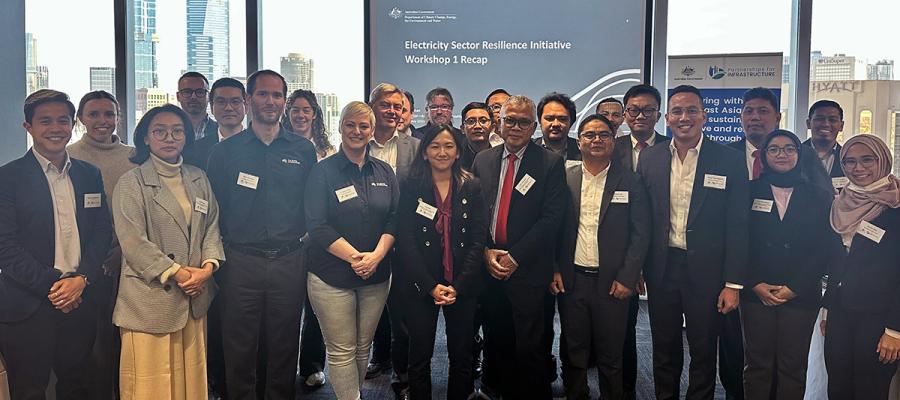If you are interested in partnering with us, please get in touch. Using P4I's flexible, innovative tools and diverse global expertise, we are confident we can design a response that is tailored to your needs.


The global energy transition presents a significant opportunity to mitigate the cause and impacts of climate change. At a regional level, Australia is proud to be partnering with Indonesia to strengthen climate resilience and support a sustainable energy future through the Australia-Indonesia Electricity Sector Resilience Initiative (ESRI). ESRI is a key workstream under the Australia-Indonesia Energy Dialogue (AIED).
The Department of Climate Change, Energy, the Environment and Water (DCCEEW) hosted the ESRI Knowledge Sharing Workshop in Melbourne between 28 – 31 May 2024, facilitated by Partnerships for Infrastructure (P4I). The workshop included 13 senior officials from Indonesia’s Ministry of Energy and Mineral Resources (MEMR), Meteorology, Climatology, and Geophysical Agency (BMKG), and State Electricity Company (PLN).
The delegates exchanged knowledge, experience and insights on climate resilience with DCCEEW officials, as well as representatives from Australia’s Bureau of Meteorology, CSIRO, Australian Climate Service, and Energy Networks Australia.
The workshop supported MEMR in its ambition to build Indonesia’s capacity in electricity sector planning for projected climate and weather changes. It also advanced ESRI’s work, building on its first workshop in 2023. ESRI aims to strengthen understanding of the benefits of enhancing electricity sector investment to support the energy sector’s resilience in a changing climate, as well as to share experiences on using climate modelling data to investigate potential future electricity sector vulnerabilities.
The workshop explored a range of climate-change related challenges each country faces as power generation becomes increasingly weather-dependent with common challenges including increasingly severe flooding and intense heat. It also included a focus on the issue of compounding and cascading climate hazards to electricity systems and the value in supporting power sector planning with increasingly detailed and reliable weather data and climate projections. The workshop also discussed Australia’s National Climate Risk Assessment as well as key climate resilience-focused projects – the Energy Climate Resilience Project (ECRP) and the Electricity Sector Climate Information (ESCI). Participants found the workshop very helpful in identifying potential steps to strengthen energy sector resilience.
The delegation also visited CSIRO’s Centre for Hybrid Energy Systems (CHES) and discussed CHES’s role as a collaboration facility for researchers and industry, including development of hybrid energy systems under different end-use load profiles. They also observed technologies assessing energy storage batteries’ performance against domestic and international standards.
If you are interested in partnering with us, please get in touch. Using P4I's flexible, innovative tools and diverse global expertise, we are confident we can design a response that is tailored to your needs.
